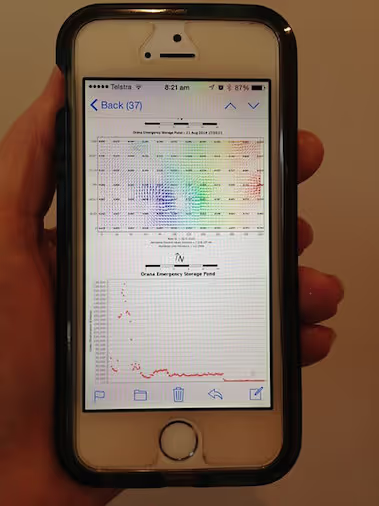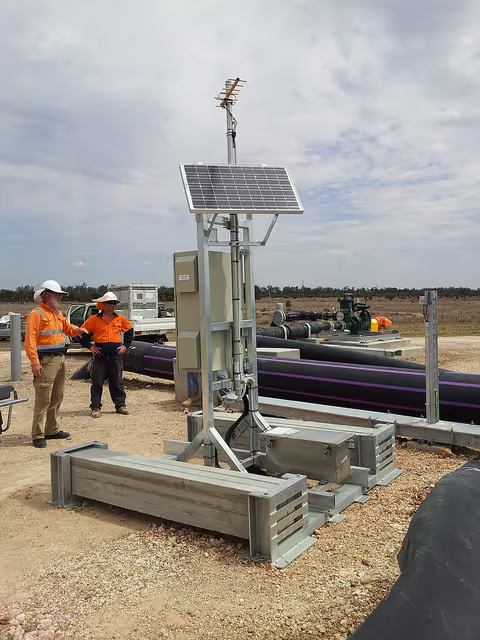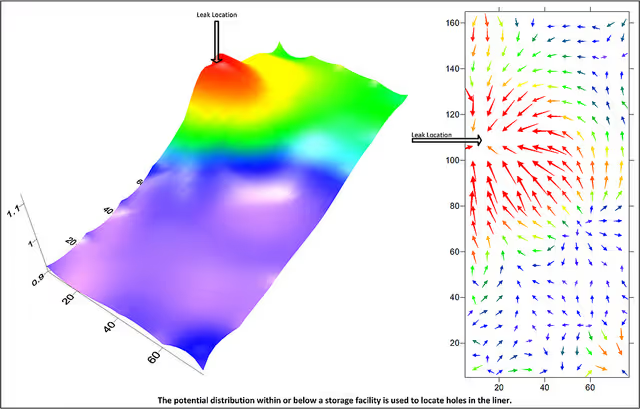Liquid Integrity Systems leak detecting technology
More than just waste storage facilities can benefit from Liquid Integrity System's new leak detecting technology

Liquid Integrity Systems new leak detection technology minimizes environmental harm due to waste product leaks with real-time problem analysis and com
Liquid Integrity Systems new leak detection technology minimizes environmental harm due to waste product leaks with real-time problem analysis and communication. — Photo courtesy Liquid Integrity Systems
Liquid Integrity Systems has created a flexible, autonomous leak-detecting system to protect customers from leaks in the liners of waste storage facilities.
Zonge Engineering is a mining service exploration company based in Australia. Its recently developed technology within Liquid Integrity Systems is simple, yet game-changing, on an international level. Kelly Keates, managing director of Liquid Integrity Systems, and her team hope to “set the benchmark in best practice for leak detection.”
Keates and Simon Mann, managing geophysicist of Liquid Integrity Systems, have a combined background in geophysics, engineering and business, which has resulted in a successful leak-detecting system: “We have been listening to what customers want in terms of risk mitigation, and Simon has been implementing these ideas into the system,” Keates said. “Now we have a product that delivers surety to customers that their facilities are not leaking.”
Real-time problem analysis and notifications; installation flexibility and ease; autonomy of stand-alone technology; and the elimination of unpredictable factors in liner readings, such as weather and human interaction, are just a few of the positive properties of Liquid Integrity’s latest leak-detecting technology.

Real-time notifications of pinpointed leaks and disruptions are sent to the owner via text message or email. — Photo courtesy Liquid Integrity Systems
A variety of industries can benefit from a system as reliable and flexible as this.
The technology is based on the insulating properties of the synthetic lining used in most storage facilities: stored liquids are not electrically connected to their surroundings. “If the liner has a hole or tear, then fluid or moisture will fill this gap and allow current to flow across the liner,” Keates said. The change in data is noted by Liquid Integrity’s software, and the results—pinpointing the location of the leak on a map of the facility—are sent directly to the owner via text message or email to a computer.
While leak-detection systems are nothing new, Liquid Integrity’s new technology allows for continuous testing with no human intervention, easy installation, safe power sources, and automatic readings delivered directly to the client. This eliminates leak-detecting factors such as weather, liquid levels and human interaction with the technology—no facility workers need to be trained to perform intricate daily checks because scheduled results are transmitted to the owner. “We are aware of a very small number of companies internationally that offer similar systems,” Keates said. “Our system offers a level of autonomy and flexibility that sets it apart.”

The leak detecting system is easily installed and even easier to use. Wireless and solar-powered technology makes the LIS leak detection system unobtrusive to existing facilities. — Photo courtesy Liquid Integrity Systems
The leak-detecting technology is beneficial to “anyone who has stored material or waste in a synthetically lined facility,” Keates said. “The justification for the system may extend from loss of valuable material (and the) desire to prevent environmental damage, to quality control of new facilities during commissioning.”
The system is easily installed on new or existing facilities, with typically no invasive or drastic changes made to the site itself. “A system can usually be installed and functioning within two or three days,” Keates said. The innovative technology is mostly above ground, and is typically wireless and solar-powered to work independently of existing systems. The stand-alone properties of Liquid Integrity’s new technology set it apart from the competition.
Given its uniquely seamless installation, Liquid Integrity Systems' leak-detecting technology can be rented to facilities looking to test the new technologies themselves. The unobtrusive technology also allows for repositioning around larger facilities; the system can be moved between liquid containers of less hazardous materials to monitor leaks on a regulated schedule, rather than continuously focusing on the same pool.
Fewer leaks mean a cleaner environment around waste storage facilities. Disastrous leaks occur regularly, whether from worn-out liners or improper installation. Liquid Integrity Systems' daily notifications, as well as real-time problem analysis and clear, accessible leak information, allow for facility workers to repair leaks quickly and effectively, minimizing the environmental risk and cost of harmful leaks.

An irregular flow of current around the lining is used to detect leaks in waste-holding facilities. — Photo courtesy Liquid Integrity Systems
Keates and her team are pleased with the reaction to their technology: “There has been an overwhelming positive reaction to the product, from pond owners to design engineers,” she said. “Large companies are reviewing their systems for liquid waste storage and are working with us to provide them with smarter solutions.” Liquid Integrity Systems hopes to see its product reach a range of industries.
Natural resources, farmers and water utilities could benefit from the company's leak-detecting system as much as large companies looking for a foolproof waste storage system.





